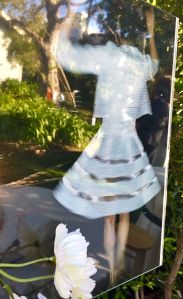It’s 2:51 a.m. and I can’t sleep. About an hour ago I emerged into consciousness with the lingering memory of a dream. It’s short — perhaps three seconds — but it keeps repeating. The frame is small, just big enough to show my legs standing on a patch of grass out of which a tree trunk is poking, in one of those planted strips between sidewalk and street. I look down and notice that the ground in front of me is sprinkled with small white spheres. They’re about the size of Pop Rocks and maybe it’s that association that makes me want to put one in my mouth to explore its taste. In my mouth I realize that the ball isn’t perfectly smooth; it’s rough enough to abrade the tender lining if I’m not careful. It bumps against the ridged roof of my mouth when I press and roll it with my tongue. Salty, I realize, very. The salt stings and makes my mouth water. Poor trees, I thought, poor grass, to survive such an acidic assault.
Now that I am awake enough to review the little movie, I realize the image is layered. I see round typewriter keys lighting up individually as I imagine writing this account; a close up of the ground littered with the white balls; and mid-range, as if across the street, a shot of the tree, its roots blanketed by sod. The images are simultaneous. I can pull back the film of one to study the one beneath, or choose to look at them all at once, the keys on top of the grass on top of the street scene.
Which made me think of photos I took at my dear classmate Mimi’s memorial. Her death was unexpected, and a stunning loss to her family and friends. Around the perimeter of the garden setting, someone had framed enlarged pictures of Mimi at different points in her life. As a child, with her sister. As an alluring young woman. As a mother. As a breast cancer survivor.
When she lost her hair, she decided to mark her battle by sitting for professional photographs. In the large image, she faces away, her arms gracefully folded atop her head, her sinuous spine bending to the side. Her dark skin is bold against the white background. Although I don’t know what process the photographer used, I imagined silver nitrate concentrating in the shadow along her spine and in the dark hair follicles on her smooth skull. Below the big photo is a smaller horizontal one of Mimi gazing upward, as if considering her transformed body. I took a picture of the picture.
When I checked the image, I realized I’d captured a reflection. A quietly composed woman, seated on a chair, appeared in a patch of light on Mimi’s back. Now I had a picture of a young woman embedded within the original one. I thought, even when she was ill, healthy Mimi was inside. And Mimi, the warrior, was always inside the healthy woman.
In a David Menaker story, the wife is described as having a poor memory of conversations. The narrator-husband writes, “They seem to light up the neurons in her brain and then fade away quickly and entirely, like subatomic particles in a cloud chamber.” I’m like that. I come away from things with a fuzzy impression, often failing to store the details, which is a decided weakness in someone who aspires to write.
But the dream makes me wonder if I’m perceiving but failing to stop and notice. Perhaps the triple vision of the dream means that we have the potential for multiple perspectives: the close-up exploration, the mid-range sense of ourselves in a space, and the distant assessment — all three at the moment that something is seen or heard, tasted or touched.
Something happened when I posted the photos of Mimi’s memorial on a private page where my writing classmates share news and musings. I uploaded eleven photos and posted a short report on the memorial. The photos showed up in Facebook’s collage mode, five images with a “+6” that indicated there were more. I folded my computer and attended to a small chore. When I returned to my computer a half hour later, one image had posted separately, seemingly by itself: a photo of Mimi dancing. Her arms are again raised, but blurred, caught in movement. Below a short white jacket, her stiff skirt flares, fluffed to fullness as she spins. In the original image, the focus is on Mimi, dancing in the dark, the only other detail being the nose of a black Mercedes. In my image, a white peony is attached to the framed photo, and the image is altered by a new element: the reflection of the garden where her friends gathered to celebrate her life. She seems to be watching the gathering, or perhaps hailing her friends. After I recovered from my shock, I thought perhaps Mimi decided to have the last word: remember me like this.
I will, Mimi. And now I must sleep…



I’m sorry to hear about Mimi’s death. I stayed in her lovely Paris apartment a few years ago and liked her immediately when we corresponded.